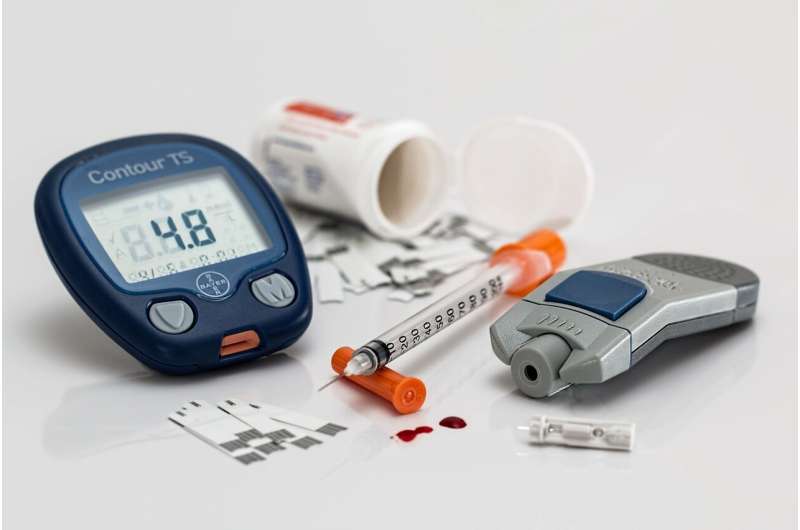Credit: CC0 Public Domain
Dear Mayo Clinic: Diabetes runs in my family. My mother was diagnosed in her 20s and requires daily insulin. Last month, my 45-year-old sister was diagnosed and is now on medication. My doctor told me I was a pre-diabetic. I am curious how I might be able to reduce my risk for diabetes, especially since I've heard that diabetics are at greater risk of COVID-19. Are there extra steps my sister and I should take to stay safe?
Answer: Diabetes is a chronic health condition that occurs when the level of sugar in the blood is too high. That happens because of a problem with the hormone insulin, which is made in the pancreas. When you eat, the pancreas releases insulin into the bloodstream. This allows sugar to enter your cells, lowering the amount of sugar in your blood.
There are several forms of diabetes, including Type 1, which is an autoimmune disorder, and Type 2, which results from both loss of insulin production and development of insulin resistance in body tissues. Gestational diabetes is another form that may occur during pregnancy.
Patients with type 1 diabetes are completely insulin deficient and require daily insulin injections. Given her age of onset and insulin requirement, your mother likely has Type 1 diabetes. Despite ongoing research, Type 1 diabetes currently has no cure. Treatment focuses on managing blood sugar levels with insulin as well as diet and lifestyle to prevent complications.
Type 2 diabetes develops when the pancreas does not make enough insulin, and the body can't use insulin as well as it should. That means sugar cannot move into the cells, and it builds up in the blood. Exactly what causes type 2 diabetes is unknown, although genetics and environmental factors, such as being overweight and inactivity, seem to be contributing factors. Your sister most likely has Type 2 diabetes.
Although there's no cure for Type 2 diabetes, studies show it is possible for some people to reverse the condition. For many patients, losing weight, eating well and exercising can help manage the disease. If lifestyle changes are not enough, some people, like your sister, may be prescribed any number of oral medications or even insulin to help them manage their disease.
Prediabetes is a condition in which blood sugar is higher than normal, but it's not high enough to be considered Type 2 diabetes. If left uncontrolled, prediabetic patients are at high risk to develop Type 2 diabetes.
The good news is that often lifestyle changes alone, such as diet and exercise, can lower your blood sugar level and decrease your risk of developing diabetes.
In general, no matter what type of diabetes a person has, monitoring and managing blood sugar are the most important things to minimize risk for complications. It can be harder to control blood glucose levels during an illness or infection.
COVID-19 is no exception.
It is important to remember that diabetic patients are not at higher risk of COVID-19 infection. Rather, people with diabetes are experiencing more severe symptoms, particularly those people whose glucose control is not optimal. Among patients who are hospitalized due to COVID-19, a higher proportion has diabetes.
Although it is not yet understood why, COVID-19 seems to affect patients with Type 1 diabetes differently than those with Type 2 diabetes. Although more research is needed, it is believed that Type 2 diabetics are having more complications due to coexisting conditions they often have, including obesity, heart disease and kidney disease.
As the COVID-19 pandemic continues, you should encourage your family to be vigilant about managing their diabetes and maintaining good blood glucose control. Also, encourage your mother and sister not to postpone visits with their endocrinologist or health care provider due to COVID-19. It is important to have regular check-ins so issues can be addressed promptly.
For yourself, commit to move more, improve your diet and monitor your blood sugar. Your family also should continue to practice good infection control, including proper hand hygiene, wearing a mask when out in public and social distancing. Lastly, stay up-to-date on any recommended vaccines to minimize your risk for illness.
©2020 Mayo Foundation for Medical Education and Research
Distributed by Tribune Content Agency, LLC.
























